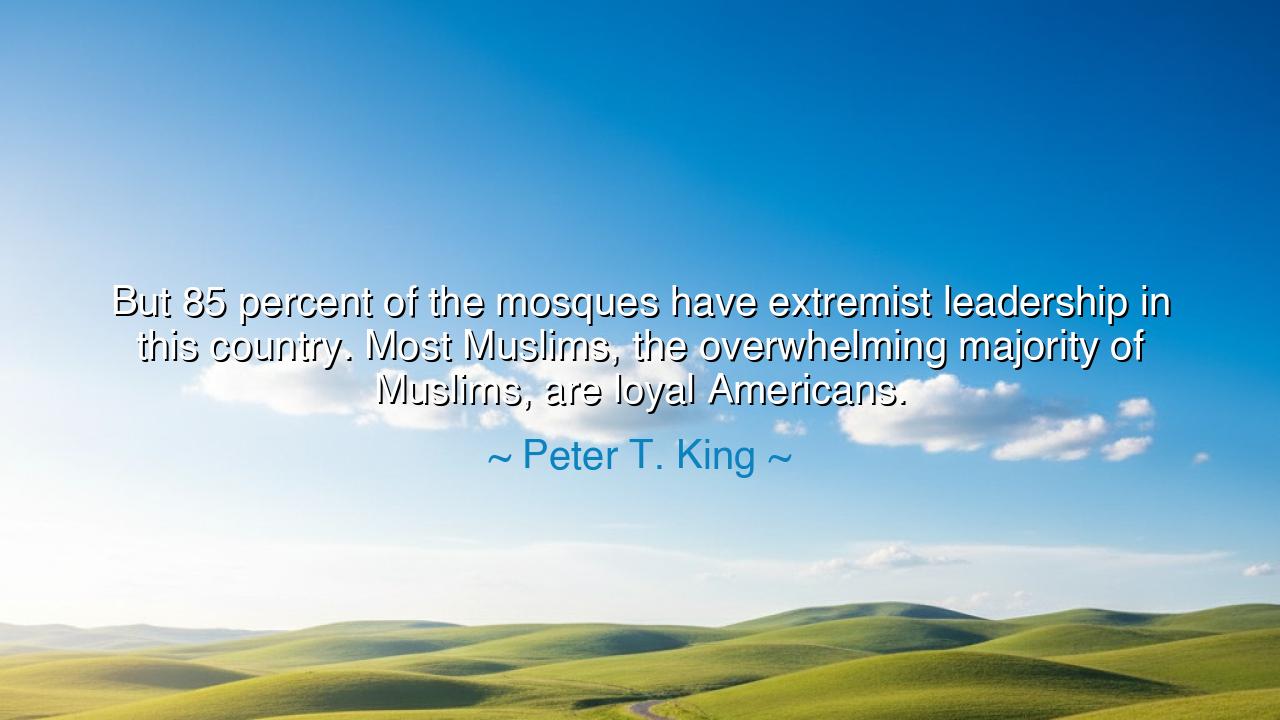
But 85 percent of the mosques have extremist leadership in this
But 85 percent of the mosques have extremist leadership in this country. Most Muslims, the overwhelming majority of Muslims, are loyal Americans.






Hear the words of Peter T. King, spoken in a moment of great tension and controversy: “But 85 percent of the mosques have extremist leadership in this country. Most Muslims, the overwhelming majority of Muslims, are loyal Americans.” In these words is found both a warning and a contradiction, both a suspicion cast upon places of worship and a recognition of the loyalty of the people within. It is a quote born of the shadows after September 11, 2001, when fear spread swiftly and trust faltered, and when the struggle to balance security with justice weighed heavily upon the nation.
The ancients often grappled with the same question: how to distinguish the few who plot in secrecy from the many who live in peace. In Rome, after the conspiracy of Catiline, suspicion fell upon citizens, and Cicero thundered in the Senate, urging vigilance. Yet even then, the danger was not from the multitude, but from a small band of agitators who sought to corrupt the body politic. King’s words echo this old struggle—how easily the acts of a few can cast doubt upon the many, and how easily the many can be wounded by fear born of suspicion.
Consider the plight of Japanese-Americans during the Second World War. Though most were loyal Americans, the shadow of war and the fear of sabotage led to their internment, a grave injustice carried out under the banner of security. The loyalty of the many was forgotten because of fear of a few. King’s statement, though seeking to acknowledge loyalty, carried with it the danger of the same wound—that by exaggerating the reach of extremist leadership, the innocent majority might bear the burden of mistrust.
And yet, the quote also contains a truth worth holding: that most Muslims, like most of any faith, seek only to live in peace, to raise families, and to honor their nation. It is not the mosques as houses of prayer, nor the worshippers within, but the danger of leaders who might twist faith into ideology that must be discerned. Throughout history, it has not been religion itself that sows destruction, but those who distort it for power. The Crusades, the Inquisition, the wars of sects—all show how leaders can corrupt faith. King’s words remind us that vigilance must be against extremism, not against an entire people.
But the danger lies in imbalance. To guard too little is to risk harm; to guard too much is to risk injustice. Wisdom, therefore, demands both courage and fairness: courage to confront extremism wherever it rises, but fairness to honor the innocence and loyalty of the majority. A nation that abandons fairness in its vigilance will destroy its own soul even as it seeks to preserve its body. The ancients said: “Justice is the foundation of the state.” Without it, the walls of any republic crumble.
The lesson, O listener, is this: never allow fear to blind you to truth. Do not cast suspicion upon the many because of the few. Learn to distinguish between the peaceful and the dangerous, between the innocent and the guilty. And above all, hold fast to justice, for justice guards not only the people but the honor of the nation itself. In every age, those who seek to protect must also guard against becoming the very threat they fear.
Thus, let Peter King’s words be remembered with care. They arose from a time of anxiety, when wounds were fresh and fear was deep. They carry both the warning of extremism and the recognition of loyalty. Take from them the wisdom that vigilance is needed, but temper it with the greater truth that the overwhelming majority are faithful, peaceful, and deserving of trust. For in honoring that truth, we build not only security, but a society that is just, enduring, and worthy of its own ideals.






AAdministratorAdministrator
Welcome, honored guests. Please leave a comment, we will respond soon